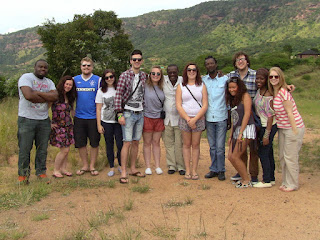The Theatre for Development research at Drama St.
Mary’s focuses on Forum Theatre & Verbatim Theatre and the charity with
whom it works for the most part with is Theatre for a Change, an organization
which uses interactive theatre to explore gender issues & HIV in sub-Sahara
Africa. We have also worked with the
London-based HIV charity, Positive East, to develop a play based on interviews
with positive men and women in London.
This play was performed in Malawi as part of a knowledge exchange
programme implemented in 2011.
Our research in Theatre for Development informs our
teaching in multiple ways: from the
very simple adoption of Theatre for a
Change’s method of conducting a seminar or meeting through the use of a
Focus Ball to allow everyone to have as much say as they want, to the adoption
of Theatre for a Change’s forum theatre work on radio for our students, to the
much more provocative ways that we approach teaching Forum Theatre to my
students as a life and death tool for behavior change when dealing with the
theme of HIV or condom use. As an
example of the latter two, for the past two years, the Theatre for Development module
has created forum theatre pieces and radio forum pieces based on HIV and gender
equality issues students face within University College.
As another example of research having impact on our
teaching, the Applied Theatre students have been exposed to aspects of the
world that they have never experienced.
The biggest example of this is the students’ trip to Africa as part of
their studies. In 2011, they went to
Malawi to study under Theatre for a Change.
In 2012, a new group went to South Africa to deliver & participate
in workshops and performances at a university, a college, a school and
community centre. Both of these work
placements are firmly grounded in our research in Theatre for Development.
Through our research, St. Mary’s students have begun
to development an understanding of the seriousness of this work and an understanding of how
performance can affect an audience. At a
Catholic university-college, students don’t expect to have a class to discuss
the pros and cons of installing condom machines in the toilets. They also don’t expect to have visiting
lecturers from the charity Health Poverty Action speaking to them about Female
Genital Mutilation in the Sudan. But not only have we discussed these issues,
the students have acted upon these discussions.
One example is that they performed a piece of Forum / Legislative
Theatre about the lack of condoms on the campus as a part of their assessed
piece.
The Applied Theatre programme at Drama St. Mary's is cutting edge with up to date knowledge exchange opportunties to explore:
In 2009, a new writing programme to develop political
writers, based on my previous research with subVERSE, an new writing company at
Theatre503 which developed new writers from 2005 to 2007, was developed to explore local, national & international issues that students feel important. This programme, A-Political Cabaret, is now in its third
year and brings in students and staff to the performances.
The Theatre
for Development programme is unique in its criteria & outcomes. No other university offers undergraduates an opportunity for an Applied Theatre work placement in an African country. This year,
the students will be returning to Durban, South Africa and next year two groups
will be going – one to Malawi and one to South Africa.
The students have also created a more local opportunity to explore behaviour change and advocacy: This is being accomplished through the Radio
Forum programme that is heading into its second year. Again, more examples of how our research
informs our teaching in multiple ways.
The lecturers here are practitioners who work in southern Africa in a variety of settings –
from schools, to colleges, to community centres to HIV clinics and street
children centres. We have live working
relationships with relevant organizations and up to date knowledge and on the
ground experience of the work. This practice
directly invigorates our teaching in the Theatre for Development module.
We teach transferable skills that are relevant to a variety of
opportunities, emphasising the fostering of a trained mind
suitable for a wide range of careers. We believe in student-centred learning. We encourage independent thinking, initiative,
innovation, entrepreneurial skills & collaboration in students.
Within
the Applied Theatre programme, we are very keen to contribute to a widening of
the debate of what theatre is and what it can be. We want to push students beyond their comfort
zone and explore other modes of performance through links with other departments & groups
such as the college radio station. We
encourage them to explore the idea of theatre as a tool for social change. We believe that an emphasis on practical work and new approaches to drama and
performance are key to a successful student.



















